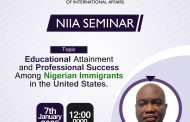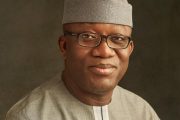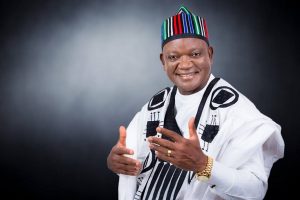
Gov Samuel Ortom, a Daniel comes to judgment?
If the cry of joy has not registered on the national radar, the problem must then lie with the disruptive impact of the fuel supply crease across Nigeria in the past three weeks. Otherwise, it has been no small quantum of communal joy that greeted the announcement of Justice Adam Onum as the Chief Judge of Benue State mid December 2017. It was never that clear that the Idoma also have capacity for praise singing. They certainty gave whatsapp extra burden in conveying approving adjectives in favour of Dr Samuel Ortom, the Benue State governor whom they all believe could have blocked Onum’s appointment if he wanted.
Perhaps, the Idoma are not to blame in turning to open adulation. It is said that the tactics of the tree climber is determined by the pattern of branching of the tree. There was Justice James Ogebe. He was as qualified as they come as far as being a Chief Judge of Benue State. He didn’t get it. There was Justice Aboyi Ikongbe. He too didn’t get it! And there is Ejembi Eko! Somehow, none of them got it, a situation the average Idoma interpret as Tiv strategy of exclusion rather than any other thing. Before these three, there was the late Justice Acheme Anyebe who ran into a big trouble with Governor Aper Aku in the Second Republic and fought up to the Supreme Court, winning most of the time. For anyone who met Justice Anyebe, his notion of the judicial officer was certainly too much of the anti-thesis of the men of money and power in Nigeria, even in the Second Republic. His mastery of Plato, Aristotle, etc and his tendency to luxuriate in them vis-a-vis his standpoint, added to his cutting edge witticism made him annoying to those he was not willing to oblige. Fortunately and unfortunately, all the three judges listed above share those traits in varying degrees and were happy about it along with fellow Idoma.
For instance, when James Ogebe became a Justice of the Supreme Court after missing Chief Judge of Benue State, one of the sharpest intellectuals of Idoma origin celebrated it by saying that, after all, the pronouncement of a Justice of that court is law itself and that the Judiciary can even unmake a law made by any other arm of the government. With such a mindset about power, the Idoma have what some of them agree to be their little chance in bargaining power in the Nigerian context until a Samuel Ortom comes to judgment. But, what can a Chief Judge do for the Idoma? Aside from belonging to a profession with strict code of conduct, since when have the Idoma developed the practice of taking communal shopping list to sons and daughters that seize the national imagination?
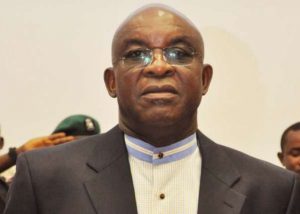
Senator David Mark: sinner or more sinned against in Idomaland?
That is how no one readily recalls any Idoma delegation that went to Senator David Mark with a communal shopping list throughout the eight long years he was the Senate President. The Tiv nieghbours of the Idoma would not have done so. The Hausa-Fulani would have led a delegation to him. And certainly, the Yorubas! Not the Idoma. It is today the basis of what might be called the revisionist argument that the Idoma missed the politics of Mark’s eight years as Senate President because Mark’s ability to spend that length “is conclusive evidence which rubbishes any other ethnic group’s myth of superiority”. Those who push this position have no qualms in ranking Mark below only Murtala Mohammed among Nigeria’s numerous retired military elite, saying that sustaining himself in power as Senate President for that length of time makes Mark a study in the management of power and that he is only not a president or former president of Nigeria by now because he is of minority stock.
Asked to explain ranking of Mark below only Murtala Mohammed, these interesting voices who are absolutely no friends of Mark but people doing their own thing gave Intervention three reasons. One, he brought some Biafran scientists to try to recreate their innovations during the war on a national scale. Two, he insisted on everyone starting on a clean slate as far as corruption is concerned and, three, he transformed the Nigerian National Oil Company, (NNOC) into today’s Nigerian National Petroleum Corporation, (NNPC) on a nationalist foundation. The conclusion of these analysts is that Murtala had nobility and a forward looking attitude that others do not have. Stretching this, they would say that if Mark’s others were not superior to him, then Mark is not a Nigerian president today because he is a minority and has not had the advantage of being packaged.
In other words, voices like this do not accept that Mark was actually undermining himself by never being seen in Otukpo with a Dangote, an Otedola or a Mike Adenuga translating corporate responsibility into action or always allowing a challenger in every election cycle when he could have settled with such elements. And above all, never deploying his grip on power to constitutionalise rotation of power, something that would have been a historical contribution to conflict management in Nigeria as well his pass to power. Although they concede limitations, they insist that only those with higher vision than Mark ought to be talking of Mark’s limitations, not those who, in their view, are no less selfish, corrupt and Machiavellian. And they go on to argue that “if Nigeria were a reasonable place, there is no way Mark would not be sought after for leadership”. Why? Mark, as the argument goes here, is a British trained expert in electronic warfare, a product of the US War College, a Fellow of the Nigerian Society of Engineers, held sensitive military and political appointments. “You may say he is selfish but these are achievements” came the clincher.
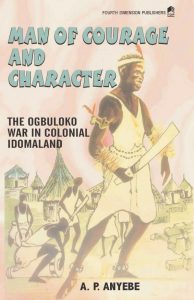
The cover of one of Justice A P Anyebe’s books in lieu of his picture
It was the surprising but interesting sort of argument that a journalist in search of viewpoints could encounter. It was interesting because of the diversity of Idomaland it depicts, the persons making the argument – some of the very best of Idoma from whichever angle one took them and thirdly, the interpretative verve of their wavelength. And then there is the strategic issue in the claim of an Idoma confusion said to imperil a numerical minority from leveraging on their mysterious advantage of permanently shooting at the national level, far above their demographic weight. That is the claim harped upon in saying that the Idoma did not make a distinction between the David Mark they felt they knew and the David Mark that they could have created in every other sons and daughters who struck national imagination. And they have been many, including two ministers in the First Republic when the Tiv had none; a service chief under General Gowon, (Ebije Ikwue who was Chief of Air Staff), a minister in the Second Republic, (Audu Ogbeh); Senate President in Ameh Ebute; nearly a dozen military governors under the Babangida – Abacha stretch, Audu Ogbeh as National Chairman of the PDP and David Mark as consecutive president of the Senate for eight years. In other words, there is a big question for a PhD thesis put on the table by this camp of reasoning in Idoma politics. The question is: To what extent is Idomaland the way it is, (poverty stricken, without a leader, etc) because the Idoma have no art of courting their successful sons and daughter who make it big?
The second part of the question is if they can gain anything from Justice Adam Onum by reversing themselves. The point has been made how Onum is only a judge, not a contractor or a politician. What is there that he can do for Idoma simply because that is his ethnic identity?
The first respondent to this question says Justice Onum does not have to do anything after breaking the record of what he sees as Idoma exclusion. “He is already a sign of good things to come. This is history because others before him have not got it” is the argument here. The second one says he can hold the office in a way that will put him in History and, by implication, his identity. This voice does not disagree with the first but has the angle of analysis that the new Chief Judge could put his name in the annals of the Nigerian judiciary by the way he runs the judiciary within the one year or so that he has left in service. As the Court of public opinion pleases!






